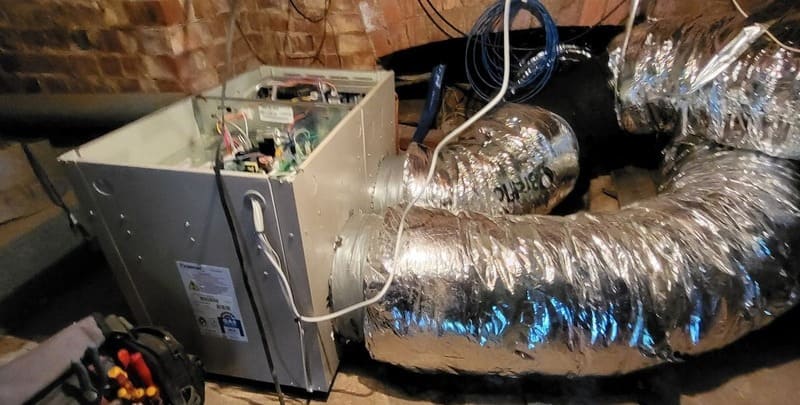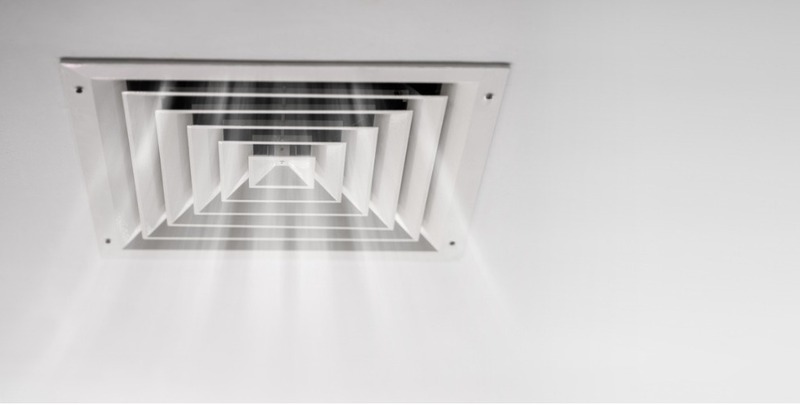How Efficient is Ducted Gas Heating for Your Home?
Published on : April 11th, 2024

When it comes to keeping your home warm and cosy during the chilly winter, ducted gas heating is a popular choice for many homeowners. But how efficient is ducted gas heating, and is it the right option for heating comfort in your home?
Let’s delve into the details to help you make an informed decision.
A gas-ducted heating system uses natural gas to produce heat and distributes it throughout your home via a network of ducts. These ducts are usually installed in the floors, ceilings, or walls of your house, allowing for even heat distribution to different rooms.
The primary components of this gas-ducted heating system include a gas burner, a heat exchanger, a fan, and a thermostat for temperature control.
The Importance of Energy Efficiency in Home Heating
Efficiency is a crucial aspect to consider when choosing a ducted heating and cooling system for your home. An efficient ducted heating and cooling system not only keeps your living spaces comfortable but also helps you save on energy costs and reduce your environmental footprint.
With concerns about climate change and rising energy prices, understanding the efficiency of ducted gas heating systems is essential.
Benefits of Ducted Gas Heating
Let’s examine the range of benefits of using ducted gas heating, including:
- Cost effectiveness: Ducted gas heating units are known for their cost effectiveness. Natural gas is often more affordable than electricity, making it a budget-friendly option for heating. That means it can help you save money on energy bills.
- Energy efficiency: One of the significant advantages of gas ducted heating and gas heating systems is their energy efficiency. Gas ducted heating systems can reach high levels of efficiency with minimal heat loss during the combustion. Gas ducted heating generates more energy than other gas heaters used to heat your home, making it an eco-friendly and wallet-friendly choice.
- Even heat distribution: Ducted systems are designed to distribute heat evenly throughout your whole home throughout. The ducted heating network ensures that every room receives a consistent level of warmth, eliminating cold spots and providing maximum comfort for all occupants.
- Quick heating response: Ducted gas heating systems have a rapid heating response. When you turn on the ducted heating system, you’ll feel the warmth almost immediately throughout the entire house. This quick heater response is perfect for those cold winter mornings when you need warmth quickly.
How Ducted Gas Heating Works
The heart of a ducted gas heating system is its ability to distribute heat through a network of ducts.
The gas burner ignites natural gas to generate the heat. A heat exchanger transfers this heat to the air, circulating gas heaters and spreading it throughout the house through the ductwork.
A fan pushes the warm air into the rooms, cooling them, and a thermostat controls the temperature, ensuring your home stays comfortable.
- Gas combustion process: The combustion of natural gas is a critical process in ducted gas heater heating. It’s both efficient and clean, producing a minimal amount of emissions. It is why ducted gas heater heating is considered an environmentally responsible choice.
- Heat distribution through ducts: The floor and ceiling ductwork, as the name suggests, is central and connected to outlets throughout the system. To ensure the distribution of warm air and avoid hot or cold spots in your home’s ceiling, we strategically place it. Properly installed and maintained ceiling ducts and outlets are crucial for the effectiveness of the installation of this heating method.

Efficiency Factors to Consider
What makes gas ducted heating so energy efficient? Let’s take a closer look:
- Insulation and home size: The insulation and size of your home or roof space influence the efficiency of ducted gas heating. A well-insulated house or roof space retains heat better, allowing the gas ducted system to work more efficiently. The size of your home or roof space also matters; larger areas may require more extensive ductwork to maintain even heating.
- Thermostat control: Proper thermostat control is essential for efficiency. Programming your thermostat to maintain an optimal temperature when you need it and lower it when you don’t can significantly impact your energy consumption.
- Regular maintenance: Regular maintenance is vital to keeping your ducted gas central heating system running efficiently. Cleaning ducts, changing filters, and scheduling professional inspections ensure that your central heating system always operates at its best.
Ducted Gas Heating vs Other Heating Options
Let’s delve into a comprehensive comparison of ducted gas heating with various alternative heating options. By exploring each, you can make an informed decision to ensure your home stays warm and comfortable.
Ducted Gas Heating vs Electric Heating
Ducted gas heating is often more energy-efficient and cost-effective than electric heating, which can require expensive running costs but less energy and power in the long run.
Ducted Gas Heating vs Radiant Heating
Compared to radiant heating, ducted gas heating provides more consistent and widespread warmth throughout the single room on each floor of your home. Glowing heat leaves cold spots and may be less efficient for larger spaces.
Ducted Gas Heating vs Central Air Heating
Ducted gas heating is a separate system from central air heating, but it can complement a central air system by providing efficient heating during the colder months. This dual approach to heating comfort can be a cost-effective solution for year-round comfort.
Environmental Impact
Here’s the list of the environmental impact of using ducted gas heating for your homes:
- Gas heating’s impact on the environment: While gas heating is generally cleaner and more environmentally friendly than other heating options, it’s only partially without environmental impact. Natural gas is a fossil fuel, and its combustion does produce carbon emissions. However, modern gas heating systems are designed to minimise emissions and increase efficiency.
- Sustainable practices in gas heating: To reduce the environmental impact, you can opt for high-efficiency gas heaters and ensure regular maintenance to keep your system running at its best. Additionally, exploring renewable energy sources or carbon offset programs can further mitigate the environmental effects of heating units.
Calculating Energy Efficiency
How do you know your gas ducted heating is energy efficient? Let’s find out.
- Energy efficiency ratings: Energy efficiency ratings, like Annual Fuel Utilisation Efficiency (AFUE) for electricity, gas, heating and cooling systems, provide a clear indication of a system or appliance’s efficiency. Higher AFUE energy ratings often signify better efficiency.
- Estimating energy savings: You can estimate energy savings by comparing your current heating costs with electricity to the expected expenses of various uses. Consider multiple factors such as insulation, thermostat settings, appliance use, and local energy prices.

Maintenance and Safety Tips
How can you keep your gas ducted heating working efficient? Here’s how:
- Routine maintenance: Regular maintenance, such as cleaning or replacing filters cold air out, inspecting ducts for leaks, and checking the thermostat, ensures your system remains efficient and safe.
- Safety precautions: Gas heating systems should have safety features like gas leak detectors, carbon monoxide detectors and proper ventilation. Regularly using gas heaters and checking these safety mechanisms is crucial for your family’s well-being.
- When to call a professional: If you have issues or suspect problems with your system’s performance or safety, you must contact a technician for a thorough inspection and necessary repairs.
Embrace Sustainability in Your Home
Ducted gas heating offers a range of benefits, including cost-effectiveness, efficiency, even heating, quickly heating cold air, and quick heating response. However, its efficiency depends on insulation, thermostat control, and maintenance. Compared to other heating options, it is a reliable choice for many homeowners.
By understanding the environmental impact of just one system and calculating the energy efficiency of just one design, you can make an informed decision. Embracing sustainable practices and regular maintenance ensures that your ducted gas heating system operates efficiently and safely, keeping a single room in your home warm and cosy.
Ultimately, the full range of efficiency and reliability of ducted gas dramatically depends on your circumstances, and it’s worth considering in the context of your specific home and needs.
In the end, the full range of efficiency and reliability of ducted gas depends on your circumstances, and it’s worth considering in the context of your specific home and needs.
Please note: This information is provided for advice purposes only. Regulations differ from state to state, so please consult your local authorities or an industry professional before proceeding with any work. See Air Con Repair Near Me’s Terms & Conditions here.